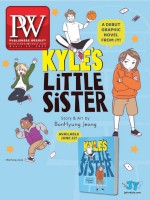The past year has thrown divisions in how we share and consume information into sharp focus: expertise vs. disinformation, the internet vs. traditional media, the rigor of science vs. the rumor of the WhatsApp group. Academic publishing has, it seems, tried to stand apart. We’re used to news media providing a rough draft of history, and then the publishing industry rowing in behind with the considered, weighty stuff. Academic publishers pride ourselves on offering expert, deep analyses of past events, or even predictions for the future; what we’re not used to is dealing with the present. But in an age when information is instant and world-changing events unfold at ever-faster speeds, can academic publishers and the researchers and faculty we represent really stick to the longer game?
It’s a question we’ve been grappling with at SAGE Publishing, an independent academic publisher with a focus on the social and behavioral sciences. As coronavirus came to dominate the headlines last year, SAGE felt it was time to make sure our expert authors were being heard and read well beyond the bounds of academia and policy. A manuscript we had commissioned was ready to go into production, but we decided to put an uncorrected proof of Together Apart: The Psychology of Covid-19 online for free download. The result was nearly 50,000 downloads—serious numbers for an academic text. Continuing to publish with Covid-19 in mind, Corwin, a SAGE company, published the Distance Learning Playbook, which used insights from social science to support K–12 instructors teaching remotely, in just six weeks (and it hit #1 on a Publishers Weekly bestseller list).
Admittedly, this responsive trend wasn’t something that came out of the blue. We’ve been grappling with how to do more responsive publishing for a while. Our series What Do We Know and What Should We Do About...? has signaled a shift from analysis to practical guides, not oversimplified but accessible to nonacademic readers.
SAGE is not alone in this among academic publishers. In response to the killing of George Floyd and the resultant surge of Black Lives Matter protests, many publishers created online resources for people who want to explore issues of racial justice. Social scientists have published incredible resources to support those who want to help dismantle systemic racism. From Laura E. Gomez’s Inventing Latinos: A New Story of American Racism, published by the New Press, to Ibram X. Kendi’s Be Antiracist: A Journal for Awareness, Reflection and Action, published by One World, social science ideas and findings are being published as the solutions to some of the most pressing social issues. For our part, SAGE compiled a collection of anti-racist social science books and articles and made it available on socialsciencespace.com.
Covid highlighted the importance of expertise in behavior and societal organization—the social sciences. Social scientists have brought their critical thinking and research methods to bear on helping society adapt and learn, from cultivating a sense of social identity to mapping the mental health impacts of lockdown and social isolation, to reengineering workforces to work from home, redesigning supply chains, and predicting the outcomes of exam result algorithms.
Where governments have failed to listen to the experts, the result has been avoidable deaths and unnecessary social and economic strain. Meanwhile, governments that took the advice of social scientists alongside other health experts have managed to successfully contain the spread of Covid and limit the damage—standout examples being Taiwan and New Zealand.
As we emerge from the pandemic, it will be vital that our leaders listen to the people who have studied and thought about how we work together, how we relate to one another, and how we manage our societies in light of the deep systemic inequalities that have been laid bare and will get worse if social science is not heeded. We are—one hopes—entering a new age in which expertise matters more, even as the forces of disinformation gather pace and power. For all their understandable caution, social scientists need to get involved, and academic publishers need to help them do so. The challenge is to ensure that the responsiveness to huge social themes is still grounded in authoritative analysis and research, which typically operates on a slower time cycle.
The reading public is thirsty for big ideas: the success of books by the likes of Yuval Noah Hariri, Shoshana Zuboff, and Daniel Kahneman have proved that finding new ways of looking at society are increasingly popular. These authors are standing on the shoulders of research done in universities across the world. Academic publishers should take advantage of their unique access to the freshest and most insightful thinking and explore new ways of bringing it to diverse audiences.
Ziyad Marar is an author and president of global publishing at SAGE Publishing. His books include Judged: The Value of Being Misunderstood (Bloomsbury).



 Volume 268
Issue 15
04/12/2021
Volume 268
Issue 15
04/12/2021





